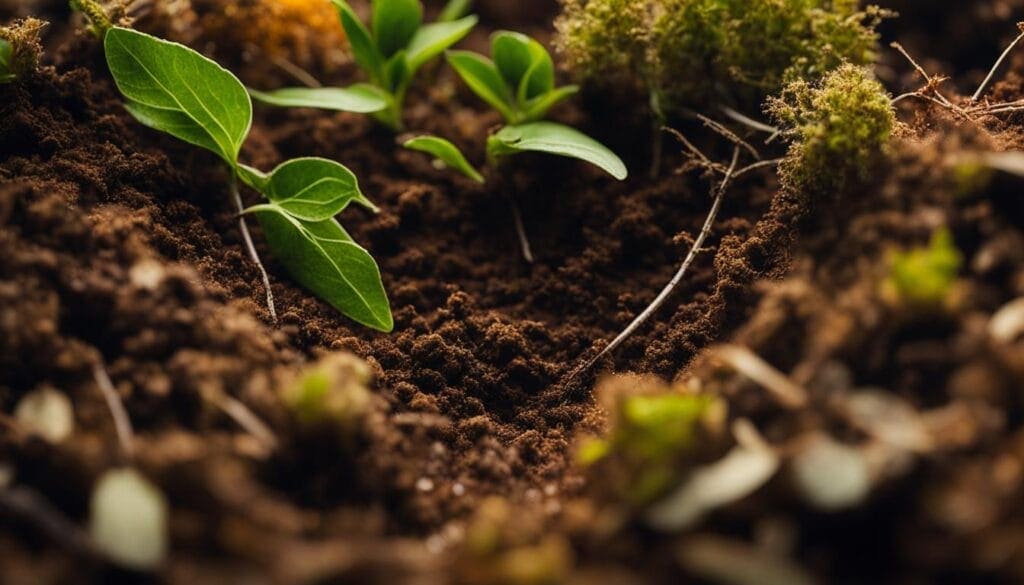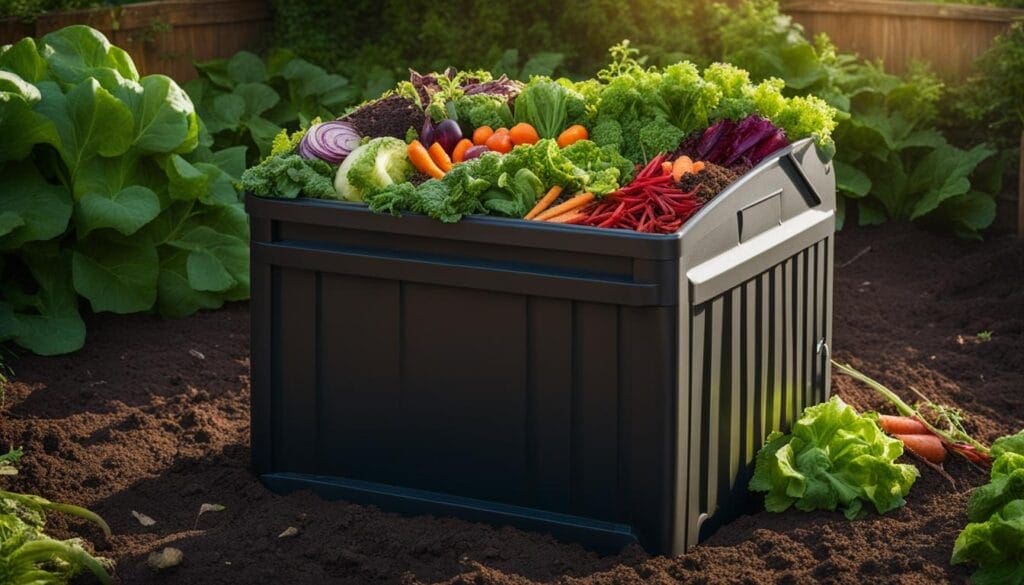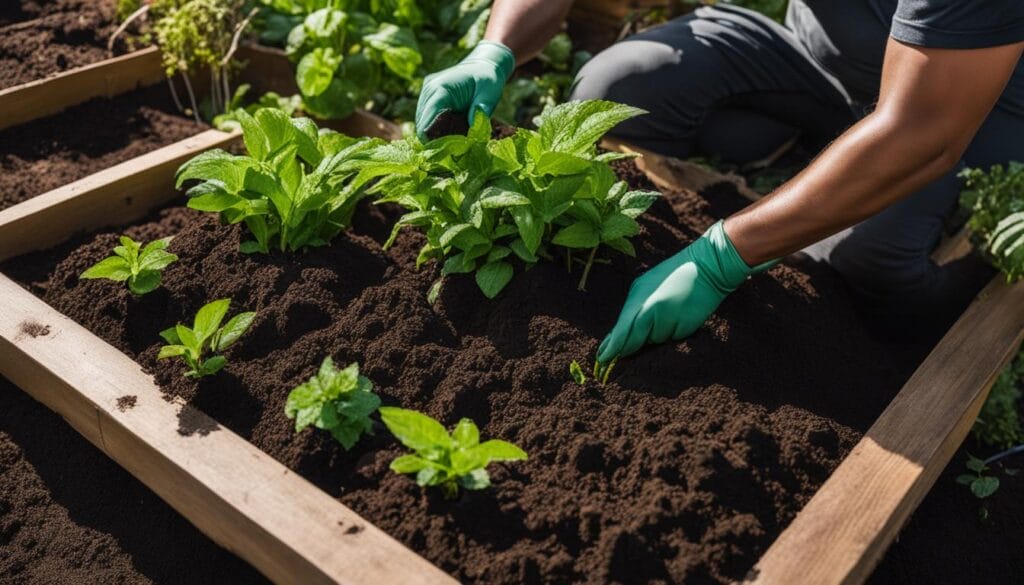Good organic soil management is crucial for successful organic gardening. If you want to cultivate a thriving garden ecosystem, it all starts with the health of your soil. By implementing natural soil care techniques and sustainable soil practices, you can create an eco-friendly and productive garden in your Australian backyard.
Key Takeaways:
- Organic soil management is essential for successful organic gardening.
- Healthy soil allows plants to absorb water and nutrients effectively.
- Use compost, manure, and leafmould to improve soil structure.
- Consider the soil pH to ensure optimal plant growth.
- Implement organic soil management practices to create and maintain healthy soil.
The Importance of Organic Matter in Soil
The health of your garden starts with the health of your soil. Organic matter, which includes a diverse mixture of living organisms, decomposing matter, and nutrient-rich substances, plays a crucial role in soil fertility and overall soil health. Adding organic matter to your soil not only improves its structure but also enhances nutrient availability and supports beneficial microbial activity.
There are various forms of organic matter that can be used as soil amendments, such as compost, manure, and plant residues. These organic materials enrich the soil by providing essential nutrients and promoting a healthy soil ecosystem. Incorporating organic matter into your soil on a regular basis helps maintain soil fertility, improves water-holding capacity, and fosters the overall health of your garden.
The Benefits of Organic Matter in Soil
- Improves soil structure
- Enhances nutrient availability
- Promotes beneficial microbial activity
- Increases water-holding capacity
- Supports a healthy soil ecosystem
By incorporating organic matter into your soil, you are providing a rich source of nutrients for your plants. This not only helps them grow stronger and healthier but also improves the overall quality of your garden’s produce. Organic matter also acts as a natural sponge, increasing the soil’s ability to retain moisture and reducing the need for frequent watering.
In addition, organic matter supports a diverse community of beneficial soil microbes. These microorganisms play a vital role in breaking down organic matter, releasing nutrients for plant uptake, and suppressing harmful pathogens. By promoting a thriving soil microbe population, you can boost the overall resilience and disease resistance of your garden.
So, don’t overlook the importance of organic matter in your soil. Take the time to enrich your soil with compost, manure, and other organic materials to ensure the long-term health and productivity of your garden.

The Benefits of Composting
Composting is a highly effective soil enrichment method and an essential practice for organic gardeners. It involves the natural decomposition of organic waste into nutrient-rich compost that can be used as an organic soil amendment. Compost is a valuable source of organic matter, beneficial microorganisms, and essential nutrients that promote soil health and fertility. By incorporating compost into your garden, you can enjoy numerous benefits that contribute to the success of your organic farming techniques.
One of the key advantages of composting is its ability to improve soil structure. Compost helps to create a well-aerated and crumbly soil texture, which allows plant roots to penetrate easily and access nutrients and water. This improved soil structure also enhances the soil’s water-holding capacity, reducing the risk of drought stress for your plants.
Another significant benefit of composting is its ability to increase the availability of nutrients in the soil. Compost contains a wide range of nutrients, including nitrogen, phosphorus, and potassium, which are essential for plant growth. As the organic matter in compost breaks down, it releases these nutrients gradually, providing a steady supply that plants can readily absorb. Additionally, the beneficial microorganisms present in compost help to break down organic matter further, making nutrients more accessible to plants.
| Benefits of Composting | |
|---|---|
| Improves soil structure | Enhances soil’s water-holding capacity |
| Increases availability of nutrients | Provides a steady supply of essential nutrients |
| Promotes the activity of beneficial microorganisms | Supports a healthy soil ecosystem |
| Reduces the need for synthetic fertilizers | Environmentally friendly soil management |
In addition to improving soil structure and nutrient availability, composting also promotes the activity of beneficial microorganisms in the soil. These microorganisms, such as bacteria and fungi, break down organic matter and help to create a balanced soil ecosystem. They contribute to nutrient cycling, disease suppression, and overall soil health. By adding compost to your garden, you create a favorable environment for these beneficial microorganisms to thrive, supporting the long-term success of your organic gardening endeavors.
Furthermore, composting reduces the need for synthetic fertilizers, making it an environmentally friendly soil management technique. By recycling organic waste and turning it into compost, you minimize waste sent to landfills and reduce the reliance on chemical fertilizers that can harm the environment. Composting aligns with sustainable soil practices and organic farming techniques, allowing you to cultivate a healthy garden while caring for the planet.
Embrace the benefits of composting in your organic gardening journey. Incorporate nutrient-rich compost into your soil to improve its structure, enhance nutrient availability, support beneficial microorganisms, and reduce reliance on synthetic fertilizers. By implementing this soil enrichment method, you can create a thriving garden ecosystem that promotes healthy plant growth and sustainable soil practices.

Understanding Soil Microbes and their Role in Organic Gardening
When it comes to organic gardening, understanding the role of soil microbes is essential for successful and sustainable practices. Soil microbes, such as beneficial bacteria and fungi, play a crucial role in promoting plant health, nutrient cycling, and disease suppression.
These tiny organisms form symbiotic relationships with plants, supporting their nutrient uptake, root growth, and overall disease resistance. By breaking down organic matter, they release plant-available nutrients and contribute to a balanced and healthy soil ecosystem.
To promote and enhance soil microbial activity, organic gardeners can take several steps. Adding compost to the soil is a great way to introduce beneficial microbes and provide essential nutrients for plant growth. Using organic fertilizers instead of synthetic chemicals can also help maintain a healthy soil microbe population. Additionally, minimizing soil disruption and maintaining organic soil management practices can create an environment where soil microbes can thrive.
The Role of Beneficial Soil Microbes
Beneficial soil microbes, such as mycorrhizal fungi and nitrogen-fixing bacteria, form symbiotic relationships with plants and offer several advantages for organic gardeners. These microbes work together with plant roots, promoting nutrient exchange and improving plant nutrient uptake efficiency.
| Microbe Type | Role |
|---|---|
| Mycorrhizal Fungi | Enhance nutrient uptake, particularly phosphorus and micronutrients |
| Nitrogen-Fixing Bacteria | Convert atmospheric nitrogen into a plant-available form, promoting healthy plant growth |
| Beneficial Bacteria | Suppress soil-borne diseases, improve soil structure, break down organic matter |
The presence of these beneficial soil microbes can significantly contribute to the overall health and productivity of the garden, resulting in stronger and more resilient plants.
The quality of the soil affects the quality of the plants it supports. By understanding the importance of soil microbes and implementing organic soil management tips, you can create a thriving ecosystem in your garden.
In conclusion, organic gardening is not just about avoiding synthetic chemicals; it’s also about nurturing and harnessing the power of beneficial soil microbes. By promoting a healthy soil microbe population through composting, using organic fertilizers, and adopting organic soil management practices, you can create an environment where plants can thrive naturally. So embrace the power of soil microbes and watch your garden flourish!
Tips for Maintaining Soil Health
Ensuring the long-term health of your soil is essential for sustainable and eco-friendly gardening practices. By following these organic gardening tips, you can maintain a thriving soil ecosystem and promote the overall health of your garden.
1. Implement Sustainable Soil Practices
Start by adopting sustainable soil practices that minimize the use of synthetic chemicals and protect the environment. Avoid the use of pesticides and herbicides that can harm beneficial soil organisms and disrupt the natural balance of your soil. Instead, opt for organic methods of pest control, such as companion planting and natural predators, to maintain a healthy garden ecosystem.
2. Use Organic Amendments
Enhance your soil’s fertility and structure by incorporating organic amendments such as compost, manure, and leaf mold. These organic materials provide essential nutrients to your plants and improve water retention in the soil. Regularly adding organic matter helps maintain the overall health of your soil and supports the growth of beneficial soil microbes.
3. Practice Crop Rotation
Rotate your crops each season to prevent the depletion of specific nutrients in your soil. Different plants have different nutrient requirements, and by rotating your crops, you can ensure that the soil remains balanced and healthy. Crop rotation also helps prevent the buildup of pests and diseases associated with specific plant families.
4. Monitor Soil Moisture
Regularly monitor the moisture levels of your soil to ensure that it is neither too dry nor waterlogged. Proper watering practices are crucial for maintaining soil health. Avoid overwatering, as it can lead to poor drainage and root rot. Conversely, underwatering can cause stress to your plants and hinder their growth. Use a moisture meter or simply perform a finger test to gauge soil moisture levels and water accordingly.
By following these tips for maintaining soil health, you can create a sustainable and thriving garden ecosystem. Remember to implement sustainable soil practices, use organic amendments, practice crop rotation, and monitor soil moisture levels. With these eco-friendly soil management techniques, you can ensure the long-term success of your organic garden and contribute to a healthier environment.
Conclusion
Organic soil management is the key to successful organic gardening. By implementing natural soil care techniques and following organic gardening tips, you can create a lush and eco-friendly oasis in your Australian backyard. Here’s a summary of the organic soil management tips to help you cultivate a thriving garden ecosystem:
1. Implement Sustainable Soil Practices
Focus on sustainable soil practices such as avoiding the use of synthetic chemicals and minimizing soil disturbance. These practices promote long-term soil health and reduce environmental impact.
2. Incorporate Organic Matter
Add compost, manure, and other organic materials to your soil. This helps improve soil structure, enhances nutrient availability, and supports beneficial microbial activity, creating the perfect environment for plant growth.
3. Use Compost
Regularly incorporate compost into your garden to enrich the soil. Compost is a nutrient-rich soil amendment that improves soil texture, water-holding capacity, and provides essential nutrients for your plants.
4. Promote Beneficial Soil Microbes
Add compost and use organic fertilizers to support the growth of beneficial soil microbes. These microbes play a crucial role in nutrient cycling, disease suppression, and overall plant health in your organic garden.
5. Maintain Soil Health
Take care of your soil by avoiding excessive compaction, minimizing erosion, and ensuring proper drainage. Regular soil testing can help you identify nutrient deficiencies or pH imbalances, allowing you to take appropriate measures to maintain soil health.
By following these organic soil management tips, you can create a thriving garden that not only benefits the environment but also yields healthier and more nutritious plants. Start implementing these techniques today and enjoy the rewards of organic gardening in your own backyard.
FAQ
What is the importance of organic matter in soil?
Organic matter plays a crucial role in soil fertility and health. Adding organic matter improves soil structure, enhances nutrient availability, and supports beneficial microbial activity.
How can composting benefit organic gardening?
Composting is an excellent practice for recycling organic waste and enhancing soil fertility. Adding compost to the soil improves its structure, increases water-holding capacity, and provides essential nutrients for plant growth.
What is the role of soil microbes in organic gardening?
Soil microbes promote plant health, nutrient cycling, and disease suppression. Beneficial bacteria and fungi support nutrient uptake, root growth, and disease resistance, making them essential for successful organic gardening.
What are some tips for maintaining soil health?
Sustainable soil practices, such as incorporating organic matter, using compost, promoting beneficial soil microbes, and minimizing the use of synthetic chemicals, are key to maintaining soil health in organic gardening.



